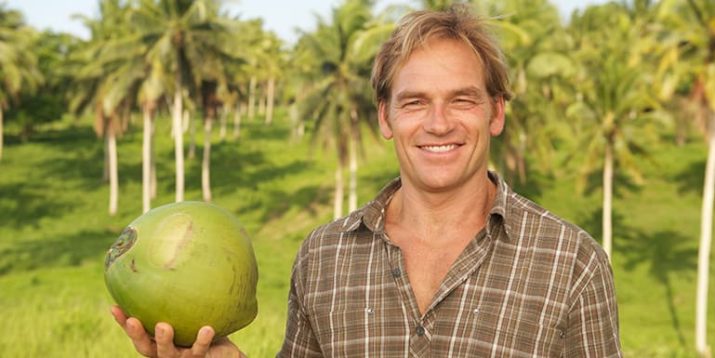Why I’m Vegan — and Why You Might Not Need to Be

I experimented with my first diet change at age 13. I saw an ad on TV for the “grapefruit diet.” I asked my mom to buy a lot of grapefruit and for the next few days, that’s all I ate instead of my usual (sugar-filled Cocoa Puffs, sodas, and candy).
That change in my diet away from processed food created a positive change in my brain and my body I could feel. And I realized — on some beginning level back then — the power of food.
I‘ve continued with that my whole life: trying on different food and diet philosophies and asking, “How does my body feel when I do this?”
And that’s how I became vegan, as part of a training experiment.
My Journey to Becoming Vegan
Ten years ago, I was training hard. I knew that breaking down animal protein put a huge energy demand on your body and that it contains acids such as uric, sulfuric, and phosphoric acid, which can be not so easy to process.
I asked, “Does my body need animal protein to maintain a high level of fitness?”
As part of an experiment, I took it all out, increased my workout loads, and started recording my results. I felt incredible and my acid reflux even went away.
Studies suggest that reducing or eliminating meat can have incredible impacts on your health.1,2,3,4 Guys, listen up, studies show a connection between vegetarian diets and increased testosterone levels. 5, 6
A third party study of the Ultimate Reset, which asks you to phase out meat and dairy over 21 days, showed that testosterone levels in men jumped by an average of 28 percent.7
Eating meat may even be causing you to lose muscle — researchers have found that a diet rich in vegetables and fruit and low in acidifying protein may help preserve muscle mass in older people.8,9
(The Ultimate Reset is a great structured way to test out how giving up animal products feels for your body.)
For the next three or four years I continued to track how I felt and kept asking myself, “Do you want fish?” “Do you want a steak?”
The answer always came back “No.”
Should You Be a Vegan?
I’m not a label. I am a vegan because it makes me feel amazing from a physical perspective, but it also felt right philosophically as well.
I have always deeply cared about animals. I can’t even hurt a fly or a spider. If one wanders inside, I will stop everything, put a cup over it, sneak a piece of paper under the cup, and take it outside.
Going physically vegan matched up with the morality that is truly me.
I became vegan after asking “What foods make me feel my best?” and being honest about the answer.
That’s why I’m not passionate about making everyone vegan. It is not realistic, and I am not an authority over anyone else’s body.
You are the best authority on you! I only want to raise awareness.
What You Should Do If You’re Considering Becoming a Vegan
If you’re going to try being vegan or vegetarian, really test it out. Over the years people have told me, “Oh, I tried giving up meat, but it just didn’t work for me.”
I always want to ask, “Gee, how hard did you try?”
We need to work at it a little. We need to shop differently. Preparing our food takes more time, effort, and thought.
We have to pay attention to what we’re eating, How do you feel with meat and without it? What did you replace the meat with?
As you do it, listen to your body and ask questions.
If you do find you need some meat in your diet, then do it with the most sacred understanding and respect that you can.
Don’t dishonor any animal’s life. If you do eat meat, make it organic and humanely raised on pasture or, for chickens, free-range. And don’t overdo it.
Studies continue to indicate we don’t need as much protein as we thought we did. 10, 11, 12
Just one last thing: if people eat less meat and more fresh, whole beautiful plants, they can still receive all the nutrients their bodies require to thrive.
References
- http://care.diabetesjournals.org/content/33/1/43
- http://care.diabetesjournals.org/content/27/9/2108?ijkey=eb317e3f146e4cd720f6de2e3b5ad5f4940398f8&keytype2=tf_ipsecsha
- http://www.pnas.org/content/112/2/542.abstract
- https://www.ncbi.nlm.nih.gov/pmc/articles/PMC4326913/
- https://www.ncbi.nlm.nih.gov/pmc/articles/PMC2374537/pdf/83-6691152a.pdf
- https://www.ncbi.nlm.nih.gov/pubmed/26965767
- http://www.journalchiromed.com/article/S1556-3707(13)00004-7/fulltext#s0075
- https://www.ncbi.nlm.nih.gov/pmc/articles/PMC2597402/
- https://www.ncbi.nlm.nih.gov/pubmed/23152092
- https://www.ncbi.nlm.nih.gov/pmc/articles/PMC3370421/
- https://www.ncbi.nlm.nih.gov/pmc/articles/PMC3988204/
- https://www.ncbi.nlm.nih.gov/pmc/articles/PMC3926840/
